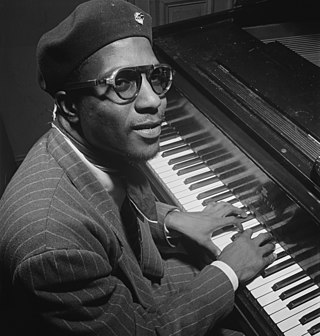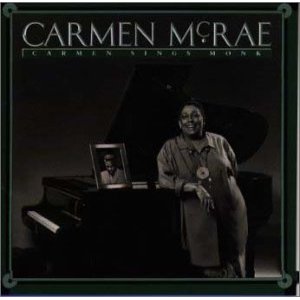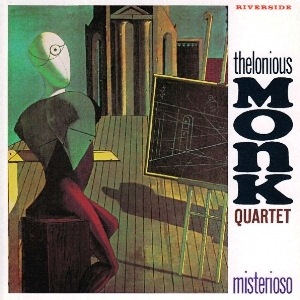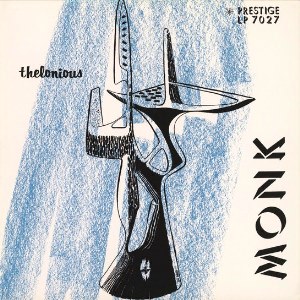Related Research Articles

Thelonious Sphere Monk was an American jazz pianist and composer. He had a unique improvisational style and made numerous contributions to the standard jazz repertoire, including "'Round Midnight", "Blue Monk", "Straight, No Chaser", "Ruby, My Dear", "In Walked Bud", and "Well, You Needn't". Monk is the second-most-recorded jazz composer after Duke Ellington.

Earl Rudolph "Bud" Powell was an American jazz pianist and composer. A pioneer in the development of bebop and its associated contributions to jazz theory, Powell's application of complex phrasing to the piano influenced both his contemporaries and later pianists including Walter Davis, Jr., Toshiko Akiyoshi, and Barry Harris.

Theodore "Fats" Navarro was an American jazz trumpet player and a pioneer of the bebop style of jazz improvisation in the 1940s. A native of Key West, Florida, he toured with big bands before achieving fame as a bebop trumpeter in New York. Following a series of studio sessions with leading bebop figures including Tadd Dameron, Bud Powell, and Kenny Clarke, he became ill with tuberculosis and died at the age of 26. Despite the short duration of his career, he had a strong stylistic influence on trumpet players who rose to fame in later decades, including Clifford Brown and Lee Morgan.

St. Elmo Sylvester Hope was an American jazz pianist, composer, and arranger, chiefly in the bebop and hard bop genres. He grew up playing and listening to jazz and classical music with Bud Powell, and both were close friends of another influential pianist, Thelonious Monk.

"Blue Skies" is a popular song, written by Irving Berlin in 1926.

Dillon "Curley" Russell was an American jazz musician, who played bass on many bebop recordings.

Barry Doyle Harris was an American jazz pianist, bandleader, composer, arranger, and educator. He was an exponent of the bebop style. Influenced by Thelonious Monk and Bud Powell, Harris in turn influenced and mentored bebop musicians including Donald Byrd, Paul Chambers, Curtis Fuller, Joe Henderson, Charles McPherson, and Michael Weiss.
"'Round Midnight" is a 1943 composition by American jazz pianist Thelonious Monk that quickly became a jazz standard and has been recorded by a wide variety of artists. A version recorded by Monk's quintet was added to the Grammy Hall of Fame in 1993. It is one of the most recorded jazz standards composed by a jazz musician.

Jazz at Massey Hall is a live album released on December 1953 by jazz combo The Quintet through Debut Records. It was recorded on 15 May 1953 at Massey Hall in Toronto, Canada. Credited to "the Quintet", the jazz group was composed of five leading "modern" players of the day: Dizzy Gillespie, Charlie Parker, Bud Powell, Charles Mingus, and Max Roach. It was the only time that the five musicians recorded together as a unit, and it was the last recorded meeting of Parker and Gillespie.

Carmen Sings Monk is a 1990 studio album by the American jazz singer Carmen McRae, focusing exclusively on the songs composed by Thelonious Monk. It was one of the last recordings released in her lifetime. McRae was accompanied by Clifford Jordan on soprano and tenor saxophone, and a rhythm section with pianist Eric Gunnison, bassist George Mraz and Al Foster on drums. Two songs, namely "Get It Straight" and "Suddenly", were recorded earlier that year live at the Great American Music Hall in San Francisco with tenor saxophonist Charlie Rouse, who played the longest time with Monk. The rhythm section was almost the same, then with Larry Willis on piano.
Frank Hewitt was an American hard bop jazz pianist.

Misterioso is a 1958 live album by American jazz ensemble the Thelonious Monk Quartet. By the time of its recording, the pianist and bandleader Thelonious Monk had overcome an extended period of career difficulties and achieved stardom with his residency at New York's Five Spot Café, beginning in 1957. He returned there the following year for a second stint with his quartet, featuring drummer Roy Haynes, bassist Ahmed Abdul-Malik, and tenor saxophonist Johnny Griffin. Along with Thelonious in Action (1958), Misterioso captures portions of the ensemble's August 7 show at the venue.

Sadik Hakim was an American jazz pianist and composer.

Thelonious Monk Trio is an album by American jazz pianist and composer Thelonious Monk. The album features his earliest recordings for Prestige Records, performing as a soloist with a rhythm section of bassist Gary Mapp, either Art Blakey or Max Roach on drums, and one track with Percy Heath replacing Mapp. It also contains the earliest recorded versions of the jazz standards "Blue Monk" and "Bemsha Swing".

This article presents the discography of the jazz saxophonist and band leader Sonny Rollins.

Solo Piano is an album by jazz pianist Tommy Flanagan. It was recorded in 1974 and released in 2005 by Storyville Records.

Bouncing with Bud, also known as In Copenhagen in later releases, is a 1962 album by jazz pianist Bud Powell, recorded in Copenhagen for Sonet Records, Delmark, and Storyville with Niels-Henning Ørsted Pedersen on bass and William Schiopffe on drums. It was re-released by Mobile Fidelity with improved audio quality on CD.

Award at Birdland, 64, also known as Earl Bud Powell, Vol. 10, is a live album by jazz pianist Bud Powell, recorded at Birdland on October 1, 1964, with bassist John Ore and drummer J. C. Moses. It was released by the Mythic Sound label in 1989.

Return to Birdland, 64, also known as Earl Bud Powell, Vol. 9, is a live album by American jazz pianist Bud Powell, recorded at Birdland on September 30, 1964 and was released by Mythic Sound in 1989. Powell's trio features rhythm section John Ore and J. C. Moses.
References
- ↑ Monk's Music: Thelonious Monk and Jazz History in the Making. Gabriel Solis. University of California Press, 2007. ISBN 0-520-25201-2. p. 149
- ↑ Jazz: The First 100 Years. Henry Martin and Keith Waters. Cengage Learning, 2005. ISBN 0-534-62804-4. p. 215
- ↑ Alberts, Don (2013). "Bud Powell". A Diary of the Underdogs: Jazz in the 1960s in San Francisco. Lulu Press. ISBN 978-1257225651 . Retrieved October 27, 2015.
- 1 2 "In Walked Bud" at Allmusic – retrieved on 3 July 2009
- ↑ Christgau, Robert (June 28, 1988). "Consumer Guide". The Village Voice . New York. Retrieved October 27, 2015.